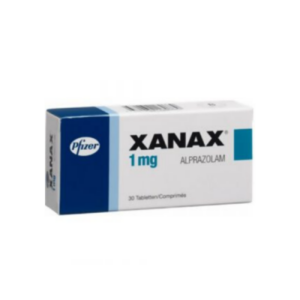Anxiety
Showing all 5 results
-

Buy Bromazepam
Buy Bromazepam -

Buy Clonazepam
Buy Clonazepam -

Buy Diazepam
Buy Diazepam -

Buy Lorazepam
Buy Lorazepam -

Buy Xanax
Buy Xanax
Sometimes anxiety is good. It is a normal, useful response to challenge and danger. However, for some people, anxiety attacks last for days, weeks, or even months. Then we talk about generalized anxiety disorder.
What is anxiety?
For many thousands of years, the human body has been conditioned to respond quickly with anxiety when threatened. This fight-or-flight response prepares the body to be faster, smarter or stronger than the opponent. With moderate anxiety you can act much better. That is why many people think that they function better under stress.
What is an anxiety disorder?
People with anxiety disorders are in an agonizing, constant, but fluctuating state of nervousness that is out of proportion to their actual circumstances. Anxiety is a normal response to a threat or to psychological stress. Everyone has to deal with that sometimes. Normal fear is based on fear and has an important survival function.
If anxiety lasts longer than the time needed to adapt to the luxating circumstance or if the anxiety is so intense that normal functioning is hampered without any justification for this, it can be said to be an anxiety disorder.
Normal fear is functional in dangerous situations and leads to activation of the individual and to physiological, behavioral and cognitive preparation for flight or fight. The physiological responses are:
- raised blood pressure
- increased muscle tone
- increased heartrate
- accelerated breathing
Anxiety is considered pathological if it is caused by (severity
of the) situation is not justified. The signaling and activation function of fear is then no longer adaptive to the situation.
Anxiety disorders are more common than other mental disorders. In the Western world, an estimated 15 percent of adults suffer from it.
However, anxiety disorders are often unrecognized, neither by the people who suffer from them nor by care providers and caregivers, and are therefore rarely treated.
What is a generalized anxiety disorder?
If you suffer from a generalized anxiety disorder, your body is unable to stop this response once the threat has passed and sees everyday events as life-threatening. You get palpitations just thinking about a bill you’re expecting. You sweat profusely and become very nervous when you have to enter a room full of strangers. And sometimes there isn’t even a clear cause for your anxiety. Your brain starts to resemble that of someone who lives in a war zone and whose neurotransmitters and the substance gamma-aminobutyric acid (GABA) in the brain no longer work properly. Attacks of unfounded fear can last from a few moments to even years.
Classic symptoms of an anxiety disorder include persistent foreboding feelings and obsessive thoughts, chest pain, difficulty concentrating, nervousness, trembling, sweating, dry mouth and hot flashes. Twin research has shown that there is a genetic cause in one third of cases. If a parent, brother or sister has it, you are more likely to get it too. In two-thirds of cases, generalized anxiety disorders arise from learned behavior. The complaints usually start between the ages of 20 and 35.
What are the symptoms of an anxiety disorder?
The main symptoms of an anxiety disorder include:
- palpitations
- dry mouth
- feeling of oppression
- nervous tension
- irritability
- restlessness
- increased muscle tension
- sleep disorders
- concentration disorders
Panic disorder and generalized anxiety disorder usually have a variable course with remissions and exacerbations. The course is characterized by periodicity
worsening and improving of complaints, often in connection with stress factors.
The course of obsessive compulsive disorder and specific phobia is often continuous and chronic. The course of social phobia and post-traumatic stress disorder depends on the severity of the complaints and the influence on daily functioning.
In approximately half of the anxiety disorders, a depressive disorder also develops after a few years. Anxiety disorders are also more likely to occur
alcohol and drug dependence, especially with social phobia.
How is an anxiety disorder treated?
Half of the patients recover within three weeks with proper treatment. And 75% feel much better after nine months.
The type of treatment you need depends on the severity of your complaints. If these don’t affect your life too much, you can start with non-drug options. Many anxiolytics (anti-anxiety drugs) have side effects and you can become dependent on them. That is why it is often better to consider them as a second choice.
Anxiety disorder medication
Anxiolytics is the medical term for anti-anxiety drugs. Medications prescribed for anxiety disorders are usually antidepressants or tranquilizers such as alprazolam, diazepam, clonazepam and lorazepam.
Due to the development of addiction, anxiolytics should not be used for longer than two months. And even then, use must be reduced slowly.
However, if the disorder makes the simplest tasks impossible, a strong approach is needed. A combination of medication and behavioral therapy is often extra effective. Whatever treatment you choose, don’t stop too quickly; research has shown that two-thirds of people treated for just six weeks relapsed, and half needed additional medication.
Psychotherapy
Psychotherapy is one of the best options to help you cope with the outside world. Cognitive behavioral therapy is particularly useful for generalized anxiety disorder. Two studies from the mid-1990s showed that this approach produces the same beneficial brain changes as the use of Prozac, which is often prescribed for this disorder. You learn to make connections between what you think and what you feel.
People with chronic anxiety are often extremely critical of themselves, which can worsen anxiety. Cognitive therapy teaches you to replace negative thoughts with constructive ones, to look at your fear differently and to develop strategies to deal with it better.
Insight therapy, also known as the ‘talking cure’, was first used by Sigmund Freud. They dig very deeply into the past and the unconscious. The goal is that through awareness you will understand where your complaints come from. Insight brings enormous emotional relief that has a healing effect.
The doctor may also recommend supportive psychotherapy. You know how nice it is to have an understanding and sympathetic ear, how reassuring it is to have someone you can trust who will tell you that everything will be fine again – that is the essence of supportive psychotherapy. You will undergo therapy with a stimulating, positive psychiatrist or psychologist who will treat you like a friendly uncle or aunt. The therapist will talk through the difficult bumps with you and help you realize that everything will be fine.
